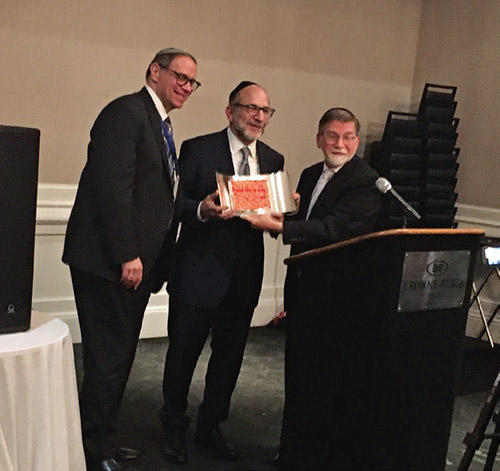

The second annual Rabbinical Council of America dinner honored the former rabbi of Congregation Ahavas Achim of Highland Park, Rabbi Ronald Schwarzberg, who received the RCA’s Distinguished Leadership Award.
Rabbi Schwarzberg left his post at Ahavas Achim in 2005 to become the director of the Morris and Gertrude Bienenfeld Department of Jewish Career Development and Placement, a part of Yeshiva University’s Center for the Jewish Future. In that role, he has placed hundreds of RIETS and RCA rabbis in congregations across the United States and helped congregations assess their needs during transitions in rabbinic leadership.
It was apparent at the dinner that even though he shifted his professional energies to YU nearly 14 years ago, Rabbi Schwarzberg still has many supporters in Highland Park and Edison. It was also apparent that he’s gained some very significant supporters in the broader Jewish community.
Speaking at the dinner, Yeshiva University President Rabbi Ari Berman talked about the turning points in people’s lives, which can prompt them “to change their whole trajectory.” He credited Rabbi Schwarzberg with counseling many rabbis facing these turning points. “Rabbi Schwarzberg has helped countless numbers of young rabbis and assisted them in finding the best versions of themselves.”
Rabbi Elazar Muskin, president of the RCA, highlighted the ideal role of a rabbi by citing a passage in Gemara Chagiga: “If the rabbi resembles an angel of God, (then) you may seek Torah from him.” Rabbi Muskin explained that this passage teaches us that, like an angel that cannot grow spiritually on its own, so too must a good rav (at times) ignore his own spiritual growth and needs to focus on the growth and progress of his students. Rabbi Muskin said, “This is Rabbi Schwarzberg’s focus in his work.”
Accepting the honor, Rabbi Schwarzberg stated, “It is times like these that I think of one of my role models as a rabbi. This exemplar helps me find my bearings when I’m feeling a bit uncertain wearing the mantle of ‘rabbi.’ This paragon of rabbi-ness inspires me because he started from unlikely beginnings, having been raised in a wholly unobservant home, and as a young adult ran afoul of the law. Most significant to me is that, early in his career in the rabbinate, this rabbi had a very notable meltdown during a particularly trying episode.”
Rabbi Schwarzberg then read from Sefer Bamidbar (11:11-15): Moshe said to Hashem: “Why have you done evil to Your servant? Why have I not found favor in Your eyes, that you place the burden of this entire people upon me? Did I conceive this entire people or did I give birth to it, that you say to me, ‘Carry them in your bosom, as a nurse carries a suckling, to the land that You swore to its forefathers?’ Where shall I get meat to give to this entire people when they weep to me, saying, ‘Give us meat that we may eat’? I alone can not carry this entire nation, for it is too heavy for me! And if this is how You deal with me, then kill me now, if I have found favor in Your eyes, and let me not see my own wretchedness.”
Citing the Seforno to explain this passage, Rabbi Schwarzberg asserted: “This emotional meltdown is not in any way a disrespect of HaKadosh Baruch Hu by Moshe, chas v’shalom, because the Torah testifies later, in the very same parsha, Parshat Beha’alotcha, that: “And the man Moshe was very humble, more than any other man on the Earth.” The Seforno suggests that in the outburst, Moshe was sharing his deep feelings of inadequacy to the task Hashem had assigned him.
Rabbi Schwarzberg continued: “Taking into account the Seforno’s view, how does HaShem respond to Moshe’s statement of personal inadequacy? The response is clear: “Hashem said to Moshe: Gather to me 70 men from the elders of Israel…they shall bear the burden of the people with you, and you shall not be alone.”
He concluded: “One thing I’ve learned in the rabbinate is that we all have moments where we feel completely spent and entirely unqualified for the work facing us. And it is precisely those times when we must seek help from others, to share our burdens with the elders of Israel, and to recognize that we can’t do it all alone, that we shouldn’t try to be the Lone Ranger, that we need the support of others to succeed, as even the greatest rav in Jewish history—Moshe Rabbeinu—also needed assistance on occasion.”
“It was a lovely dinner, honoring an exceptional rav who has had a serious impact on the Jewish community in Highland Park,” said Barry Levinson of Highland Park. “I was gratified that there was such a strong turnout from Highland Park and Edison, including seven former presidents of Ahavas Achim, which is a reflection on how beloved Rabbi Schwarzberg is.”
By Harry Glazer
�










